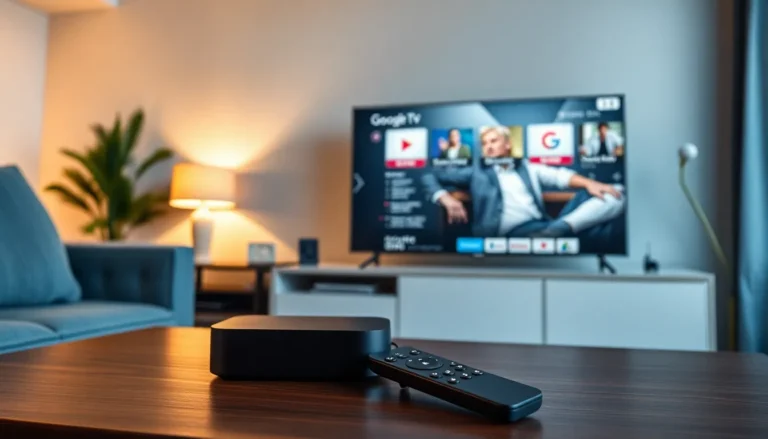In a world where scrolling through feeds feels as essential as breathing, the thought of stepping away from social media might seem downright ludicrous. But what if taking a break could actually recharge your mental batteries? Social media withdrawal isn’t just a trendy phrase; it’s a real phenomenon that many are beginning to embrace.
Table of Contents
ToggleUnderstanding Social Media Withdrawal
Social media withdrawal occurs when individuals take a break from platforms like Facebook, Instagram, or Twitter. This process aims to improve mental well-being by reducing exposure to online stimuli.
Definition of Social Media Withdrawal
Social media withdrawal refers to the period wherein a person actively disconnects from social media usage. This disconnection can vary in duration, from days to months. People commonly engage in this practice to escape the pressures of online interactions. The increasing awareness surrounding mental health often drives individuals toward this choice. Taking a step back fosters a more mindful approach to technology and personal relationships.
Symptoms and Signs
Numerous symptoms can indicate social media withdrawal. Increased irritability often arises when users step away from social media. Feelings of anxiety typically surface for those accustomed to constant online engagement. Changes in mood, such as feelings of loneliness, may also occur during this transition. Some individuals experience difficulty focusing on tasks outside of social media. Others note a compelling need to check notifications, signaling dependency on these platforms.
Causes of Social Media Withdrawal


Social media withdrawal stems from various psychological and social factors that deeply affect individuals. Understanding these causes helps clarify why many choose to disconnect.
Psychological Factors
Anxiety levels often rise due to constant online interactions. They may feel overwhelmed by the pressure to present a perfect image. This constant comparison leads to feelings of inadequacy and low self-esteem. Emotional fatigue results from excessive exposure to negative news or conflicts on social media. Additionally, individuals may experience obsessive behaviors, driven by the compelling need to stay updated. Recognizing these psychological burdens encourages many to retreat from social platforms for better mental health.
Social Factors
Social dynamics play a significant role in social media withdrawal. Peer pressure can create unrealistic expectations for online engagement. Friends and family may inadvertently contribute to feelings of inadequacy through their highly curated posts. Isolation occurs when individuals feel their real-life relationships suffer due to virtual interactions. Changes in social circles or transitions in life stages might also prompt disconnection. Recognizing these factors aids in understanding the complexity behind the decision to withdraw from social media platforms.
Effects of Social Media Withdrawal
Taking a break from social media can lead to significant effects on individuals both emotionally and behaviorally.
Emotional Impact
Withdrawal from social media often results in improved emotional well-being. Individuals frequently report reduced anxiety after disconnecting from these platforms. Increased irritability can occur initially but typically subsides as users adjust. Mood stabilization is common, with many feeling more content without constant online comparisons. Feelings of loneliness may initially arise as users navigate disconnection, yet meaningful real-life relationships often begin to flourish during this time. Overall, a reestablished sense of self can emerge, freeing individuals from the pressures of online personas and curated lives.
Behavioral Changes
Behavioral shifts usually accompany social media withdrawal. Increased focus on offline activities, such as hobbies or exercise, often manifests as individuals redirect their attention. Enhanced productivity may occur as distractions from notifications decrease. Sleep patterns can improve, leading to better overall health. Many find that their time management skills sharpen, allowing for more effective use of daily schedules. Real-life social interactions may become more fulfilling as users invest energy in friendships without digital interferences. These changes contribute to a more engaged and balanced lifestyle away from screens.
Coping Mechanisms for Social Media Withdrawal
Coping mechanisms can help individuals manage the challenges of social media withdrawal effectively. By employing strategies that focus on reducing online presence and enhancing offline experiences, people can foster greater well-being.
Gradual Reduction of Usage
Reducing social media use incrementally can ease withdrawal symptoms. Setting specific time limits for daily use might help. For instance, decreasing usage by 30 minutes each week allows for a smoother transition. Users find that tracking their time spent on these platforms can raise awareness of habits. Replacing scrolling with other activities creates a sense of control. Many benefit from using app features that monitor screen time. They often report feeling less overwhelmed as they adapt to reduced online interactions.
Engaging in Offline Activities
Finding joy in offline activities significantly aids in overcoming social media withdrawal. Pursuing hobbies such as reading or painting keeps the mind occupied. Connecting with friends face-to-face nurtures social bonds. Exercising outdoors improves mood and mental clarity. Joining community groups or clubs fosters new relationships and interests. Individuals often discover skills and passions that were overlooked while engrossed in online content. Engaging in these activities fills the time previously consumed by scrolling, leading to a healthier lifestyle.
Social media withdrawal presents an opportunity for individuals to reclaim their mental health and foster meaningful connections. By stepping away from the constant barrage of online content, many find clarity and a renewed sense of self. This break not only alleviates feelings of anxiety and inadequacy but also encourages engagement in real-life relationships and activities.
The journey through withdrawal can be challenging but ultimately rewarding. As individuals learn to navigate their lives without the influence of social media, they often discover newfound interests and improved well-being. Embracing this intentional disconnection can lead to a more balanced and fulfilling lifestyle, free from the pressures of online comparison.








